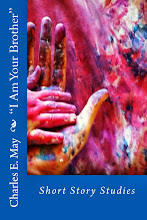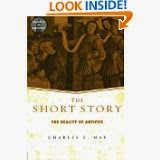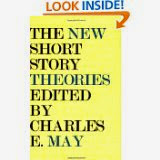To celebrate Alice Munro's 84th birthday today, I am posting the first few paragraphs of my new essay on Munro, which will appear in a book to be published in Canada soon. I will give you the publication information and date when I receive it.
Living in the Story:
Fictional Reality in the Stories of Alice Munro
Charles E. May
Professor Emeritus
California State University, Long Beach
Throughout her
distinguished career, Alice Munro has frequently been asked by reviewers and
interviewers, "Why do you write short stories?" behind which, of
course, always lurked the reproach, "Why don't you write novels?"
Although she is no longer nagged about her narrative choice of the much
maligned short story, reviewers and interviewers have shifted to a new tactic. Instead
of chiding Munro for not writing novels, they now try to account for the
success of her stories by claiming that they are like novels, not like short stories at all. How else to account for
how great they are? Two or three such claims should be sufficient to underline
the point:
"No one else quite constructs short
stories that have the slow, rich emotional depth of novels.""
(Lockerbie)
“You
get, in fact, all the complexity and nuance of a novel, concentrated within
several dozen pages.” (Springstubb)
"Each story reads like a novel; each
is a vast canvas of complicated characters, tangled events and quietly
turbulent revelations.” (Changnon)
Munro definitively answered
the impertinent "Why do you write short stories?" question back in 1986,
when she said that originally she planned to write a few stories to get some
practice and then to write novels, but shrugged, “I got used to writing
stories, so I saw my material that way, and now I don’t think I’ll ever write a
novel" (Rothstein). And now everyone, even, I dare say, her agent and her
publishers, are glad she never did.
Given my long-time
interest in the genre, I have always been very gratified by Alice Munro's suggestion
that there is a "short-story
way" of seeing reality and delighted with her persistent denial that her
stories are like novels. She has said
she is not drawn to writing novels because she doesn't see that people develop
and arrive anywhere, but rather that they live in flashes, from time to time
(Hancock)--an image that echoes Nadine Gordimer's famous argument that the
short story as a form may be better equipped than the novel to capture whatever
can be grasped of human reality where contact is like the" flash of fireflies,
in and out, now here, now there, in darkness" (180).
Munro has said, "I'm
after the intensity of moments and layers of meaning that come from short
stories. I want these moments to be bright and clear and also filled with
density and mystery. I couldn’t get that from the novel form… I don’t understand
where the excitement is supposed to come from in a novel, and I do in a short
story" (Rothstein). On another occasion, she used a metaphor to describe
this short-story excitement. “I can get a kind of tension when I’m writing a
short story, like I’m pulling on a rope and I know where the rope is attached. With
a novel, everything goes flabby" (Struthers).
Still, it seems that
reviewers can find no other way to explain the complexity of Munro's works
except by lumping them together with that "flabby," or, as Henry
James once called it, "baggy," monster--the novel. Can we blame her
then for not being able to resist a sly jab at short story naysayers in a fairly
recent story in Too Much Happiness entitled
“Fiction"--in which the central character buys a book written by a woman
she has met briefly at a party and is disappointed to find out it is a only collection
of short stories, not a novel: “It
seemed to diminish the book’s importance, making the author seem like somebody
who is just hanging on to the gates of Literature, rather than safely settled
inside” (52).
Jonathan Franzen scolded critics
and judges for the international neglect of Munro a few years ago by chiding, "The
feeling
in Stockholm is that too many Canadians and too many pure short-story writers
have already been given the Nobel Prize." We are all happy now that Alice
Munro is safely inside the Nobel gates of Literature—even if she does only write short stories. In one of her
first interviews after winning the prize, she graciously said that the award
was not only a wonderful thing for her, but a wonderful thing for the short
story in general, and she hoped it would bring new readers to the form (Smith).
Despite critics''
insistence on the "novelistic" nature of Munro's stories, the
qualities of her work that are so compelling are actually the very qualities
that have always made great short stories so powerful: for example, the short
story's transformation of seemingly trivial and unrelated material into a
tight, thematically-significant pattern. Fellow short-story master, Deborah
Eisenberg has said that one of the joys of Munro's writing is "the
apparently casual narrative that turns out to have led inexorably to some
inescapable juncture."
And another fellow short-story writer, Lorrie Moore,
noted, "The particular and careful ways Munro's themes are laid into her
narrative trajectories cause them to sneak up upon the reader" (41). As I
have argued for many years, this has been one of the dominant characteristics
of the short story form since Gogol, Poe, Hawthorne, Maupassant, Chekhov. Like
the stories of her predecessors, Munro's
fictions build toward a tightly unified thematic pattern, not the construction
of a mirror in the roadway.





1 comment:
A great beginning to your book on Alice Munro. Congratulations (in advance) on its publication!
Post a Comment